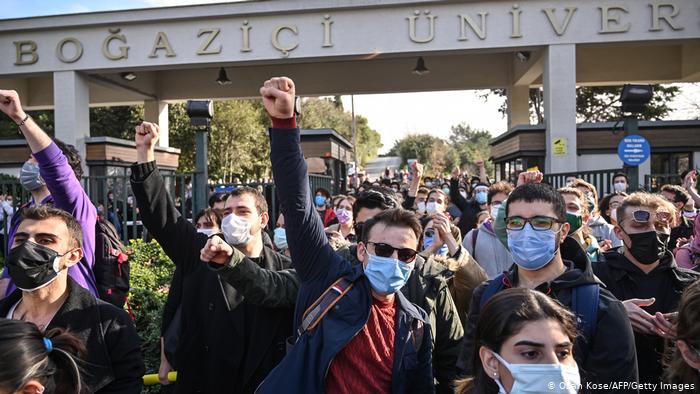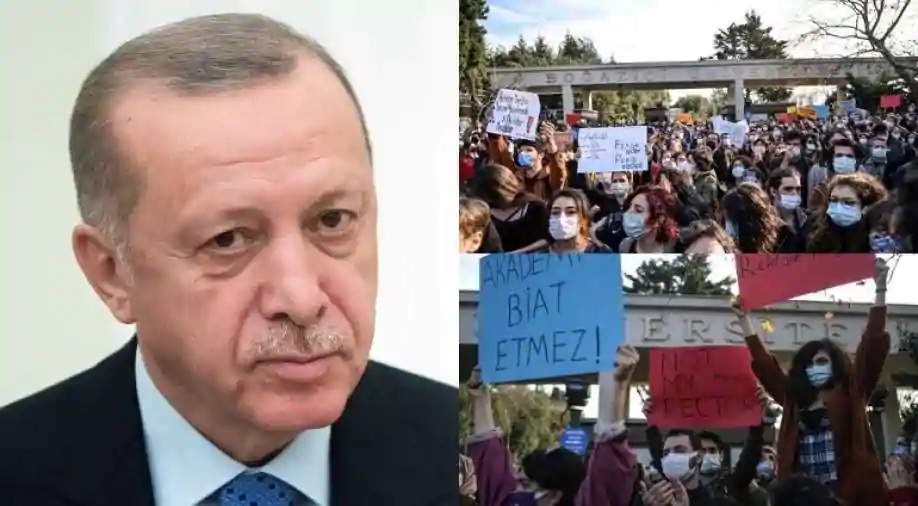
- The protests which started against the politically motivated appointment of a rector who was close to Presidnet Erdogan, have now diversified into other issues of stifling of freedom of speech and expression by Erdogan’s government.
- Erdoğan called the protesting students as “terrorists,” accusing them of exploiting a “routine appointment” to stir unrest at other universities.
- The government seems to be in no mood to listen to the protesting students as police barricades and security forces in riot gear have been lined up on the streets since Feb 1st near the main entrance of Istanbul’s Bogazici University.
- Early this week, four students were arrested in Istanbul over an artwork that reportedly depicted LGBT rainbow symbols alongside an image of a sacred Islamic site.
- The student anger during the past few weeks had been simmering since 2016 when Erdogan abolished university rector elections and instead gave power to his government to appoint rectors and other officials at the universities after the coup attempt to unseat him.
- The current clampdown on students and universities has put Turkey at the bottom of the Academic Freedom Index alongside countries like Libya, Iran, North Korea and China.
The Turkey student protests which started in early January have now entered the 5th week with agitations intensifying each day. The protests which started against the politically motivated appointment of a rector who was close to President Erdogan, have now diversified into other issues of stifling of freedom of speech and expression by the authorities and government.
On 2nd January, students began demonstrations at Istanbul’s Boğaziçi University after Erdoğan overrode the university’s tradition of electing one of its own faculty members to the post of Rector and appointed Melih Bulu, a former politician to the position. As the government tried to quell the protests, students at other universities began staging protests in solidarity with students at Boğaziçi and against their own state-appointed administrators.
The students are also protesting against the arrest of LGBT activists who are accused of blasphemy and tarnishing sacred Islamic iconography in their artworks. The students have accused Erdogan’s government of trying to impose religious restrictions in the universities hampering their freedom freedom of speech and expression. At many universities including the Boğaziçi university, lecturers too have joined the students in the protests.
The government seems to be in no mood to listen to the protesting students and lecturers, though it has spread to many other universities in the country and is intensifying every day. The police have cracked down on campuses in order to quell the protests. Police barricades and security forces in riot gear have been lined up on the streets since Feb 1st near the main entrance of Istanbul’s Bogazici University. Sniper units, intelligence and drones have been reported to be monitoring the student activity.
Durig January second week when the protests were limited to one or two universities, Erdoğan called the protesting students as “terrorists,” accusing them of exploiting Bulu’s “routine appointment” to stir unrest at other universities. Erdoğan further blamed the students of being not creative enough. In response, the students called for sending artwork to the campus. In the following days than 500 artworks from more than 150 artists arrived at the campus and are exhibited there in the Resistance Exhibition.
Few days later, Police teargassed students outside the school gates and released footage of heavily armed units raiding homes and detained 45 students.
Early this week, four students were arrested in Istanbul over an artwork that reportedly depicted LGBT rainbow symbols alongside an image of a sacred Islamic site. The artwork reportedly depicted LGBT rainbow symbols alongside the Kaaba, the building at the centre of the Masjid al-Haram – the Great Mosque – in Mecca, Saudi Arabia, the most sacred site in Islam. There was also an image of the Shahmaran, a popular Middle Eastern mythical creature, half woman and half snake.
The Istanbul Governor’s Office said the artwork was an “ugly attack” that “mocked religious beliefs”. The interior minister tweeted that the students were “deviants”, drawing an angry response from activists. While homosexuality has not been banned in Turkey, under Erdogan’s Islamist government, official opposition to the LGBT community has grown in recent years. The Istanbul Pride march was banned for five years in a row up to 2019.
The arrests of students further fuelled the protests at more universities. While the students bodies said that their goal is not to disrespect public values, as the main goal of the protests was to oppose the “anti-democratic appointments” to the university. Students now say that the government is using the ‘anti-Islamic’ artwork to turn public opinion against ongoing demonstrations.
Erdogan abolishes university rector elections

The student anger during the past few weeks had been simmering since 2016 when Erdogan abolished university rector elections and instead gave power to his government to appoint rectors and other officials at the universities after the coup attempt to unseat him.
In July 2016, attempt was made by a faction within the Turkish Armed Forces that organized themselves as the Peace at Home Council to seize control of state institutions, including the government and President Recep Tayyip Erdoğan. The Council cited an erosion of secularism, elimination of democratic rule, disregard for human rights, and Turkey’s loss of credibility in the international arena as reasons for the coup.
Erdognan’s government said the coup leaders were linked to Fethullah Gülen, a Turkish businessman and cleric who lives in Pennsylvania. The Gülen movement has been designated as a terrorist organization by the Republic of Turkey which alleged that Gülen was behind the coup and that the United States was harboring him.
An extensive purge of the Turkish civil service began in the wake of the coup attempt where by 20 July 2016, over 45,000 military officials, police officers, judges, governors and civil servants were arrested or suspended, including 2,700 judges, 15,000 teachers, and every university dean in the country. Many institutions and Universities were renamed to commemorate the failed coup.
In October 2016, months after the coup attempt, Erdogan issued a new decree abolishing the election of university rectors working in state-run institutions. The decree also contained provisions for the dismissal of 1,267 faculty members from universities across Turkey, bringing the total number of professors dismissed since the coup attempt to over 4,000. Experts had warned that the decree supports the view that Erdogan will use the fallout from the failed military coup to tighten his control over the government and the institutions of the state and silence his critics.
Observers have opined that arrests and dismissals of professors since the failed coup in 2016 have already eroded autonomy at the country’s 200 or so universities. The campus crackdown today is part of broader backtracking on freedoms in Turkey that has crippled the press, civil society and the political opposition as has Erdoğan tightened his grip on power on all fronts.
The current clampdown on students and universities has put Turkey at the bottom of the Academic Freedom Index alongside countries like Libya, Iran, North Korea and China. The report, compiled in part by the Scholars at Risk Network, says under Erdogan Turkey is among the 10 countries whose scores worsened the most in the last five years.
